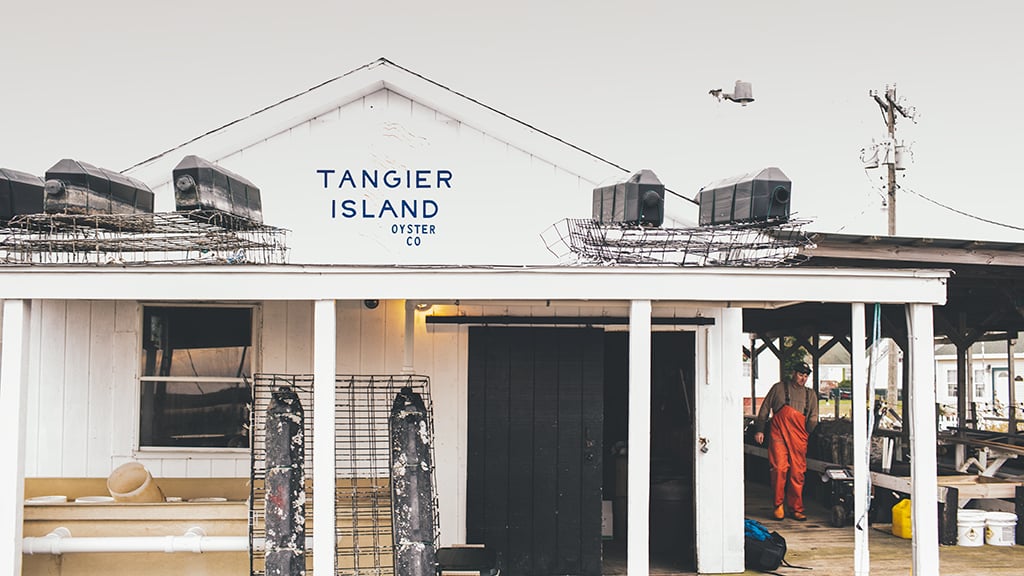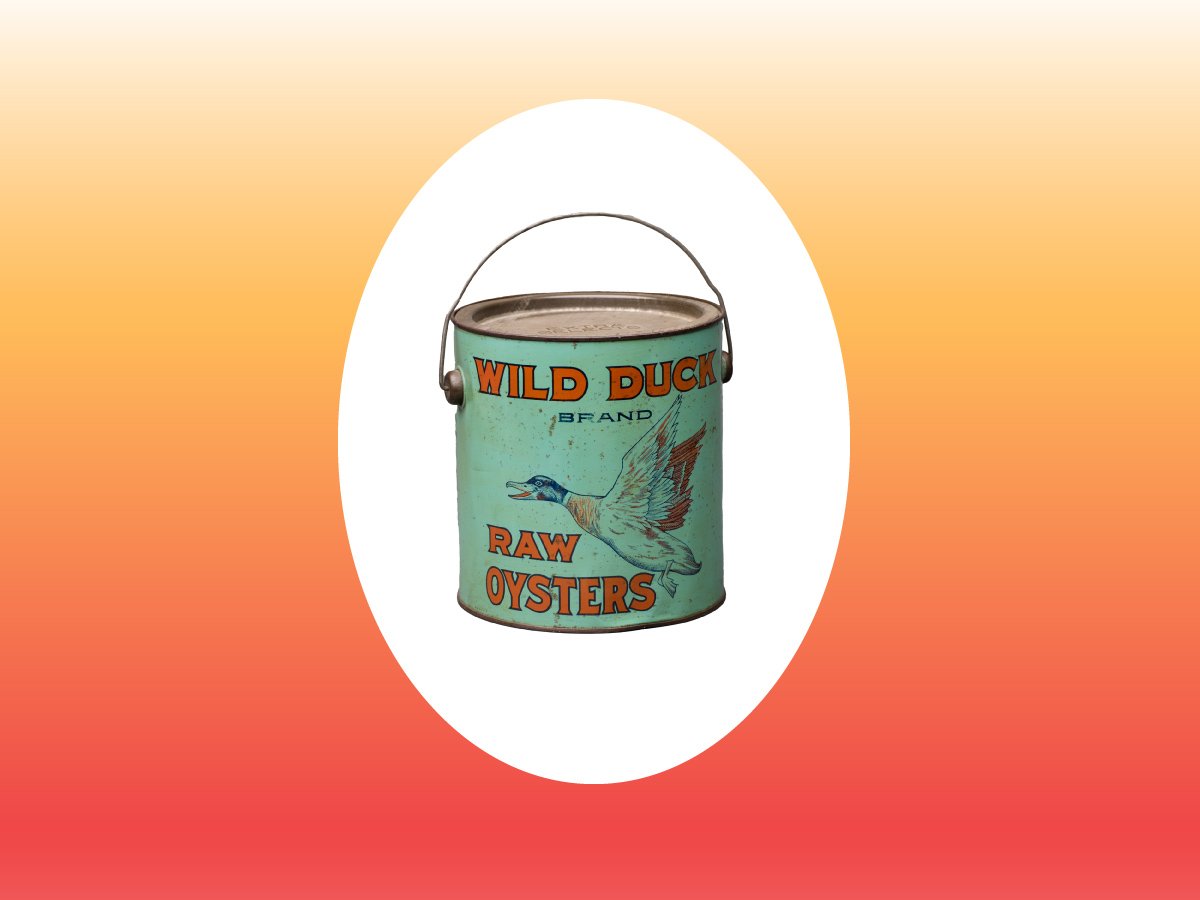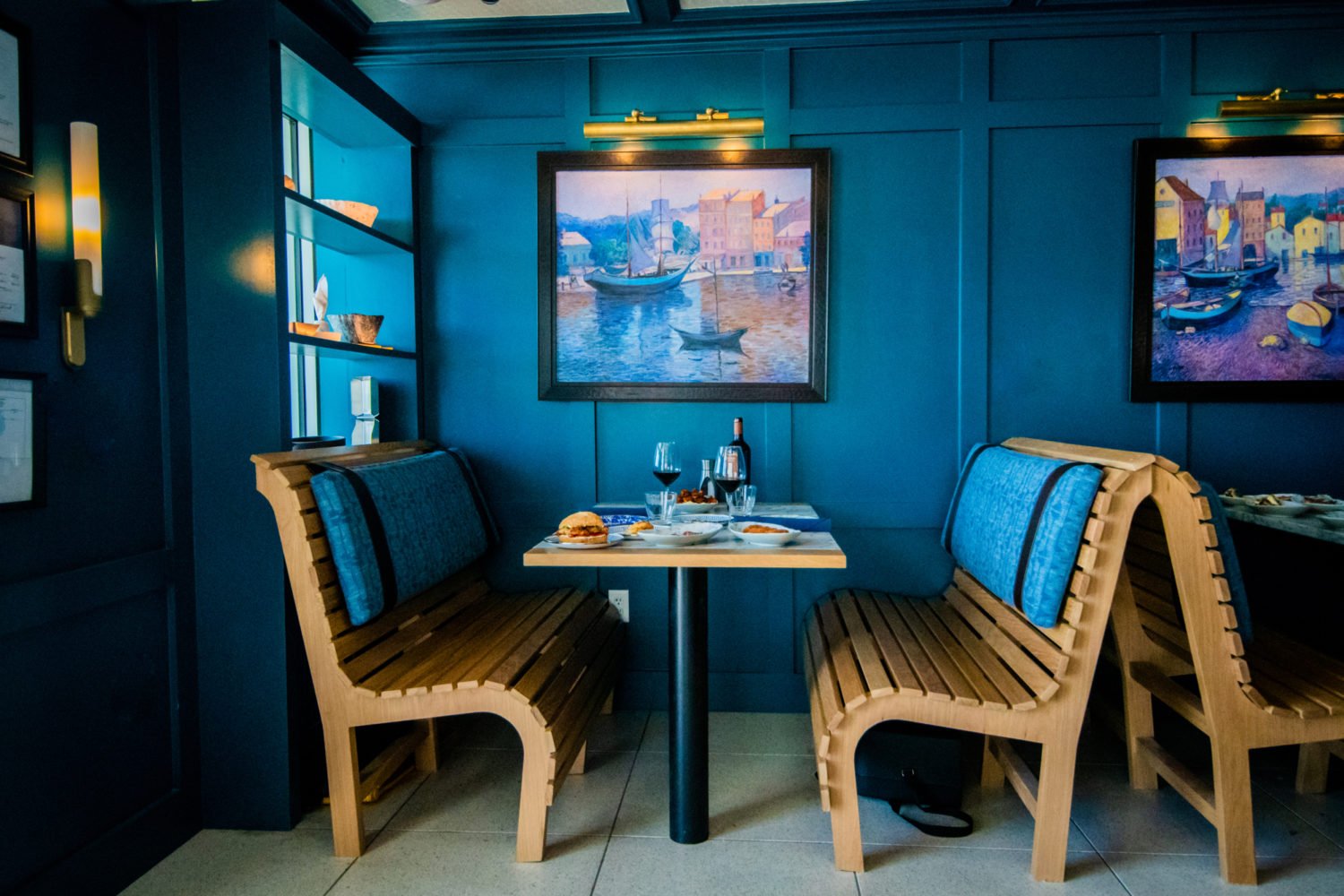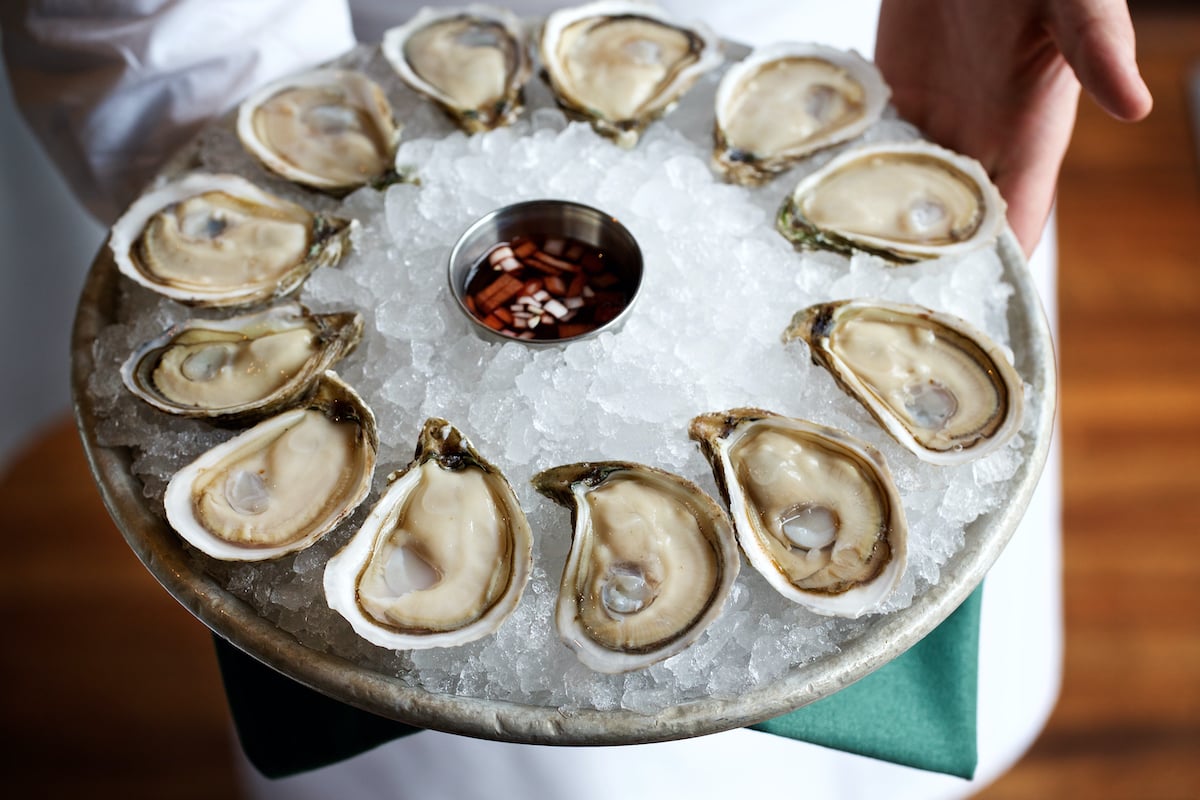The water is 54 degrees, cold enough that Craig Suro lets out a yelp when he dives in. Stinging sea nettles the size of Ping-Pong balls dot the surface around him. To make matters worse, Suro needs to go to the bathroom. “Can you piss in a wetsuit?” he asks.
We’re floating a few hundred yards off Tangier Island, a speck of land in the Chesapeake Bay. Beneath us is some of the bay’s finest oyster-growing territory. Its waters are salty but not too salty, a moderate 17 parts per thousand. Enough algae is borne on the currents for millions of oysters to gorge themselves happily. Suro and his partners have bet half a million dollars on being able to turn this patch of bay into an oyster-farming empire.
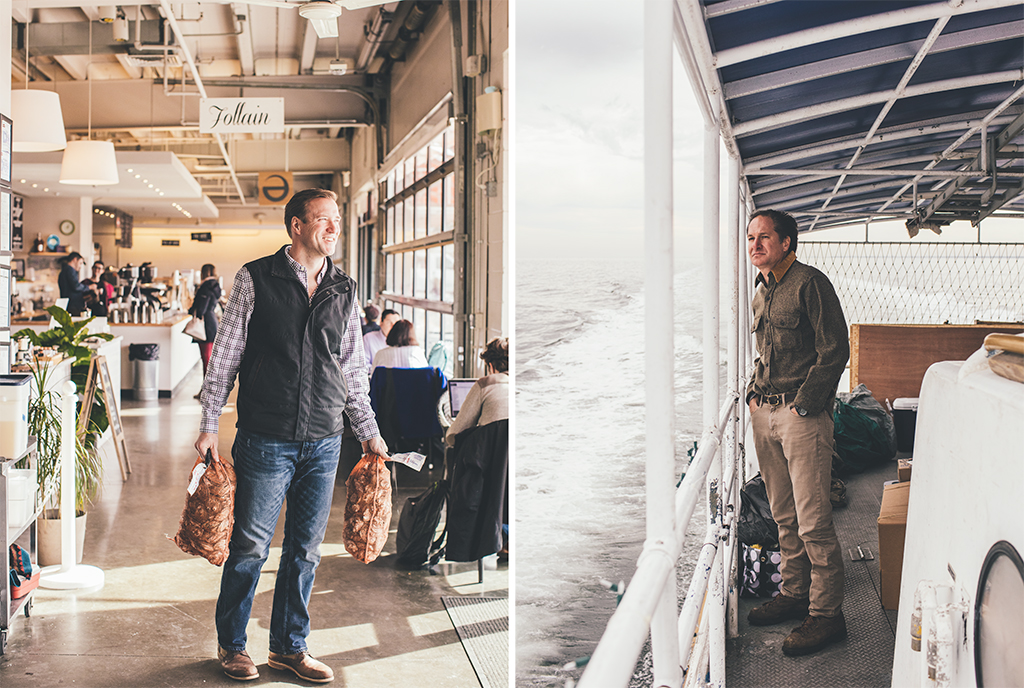
But today, alas, there are no oysters in the water. Instead, it’s Suro and his business partner, Tim Hickey, who are six feet under in murky, frigid water. They’re on a recovery mission.
The childhood friends descended on Tangier a year earlier. Starting an oyster farm on one of the bay’s last inhabited islands was a bold, admittedly romantic idea. Tangier, just 1¼ square miles, isn’t exactly a magnet for outsiders. Nearly all of its 450 residents attend church every Sunday and Wednesday and speak in a so-called Shakespearean accent passed down from their Cornish ancestors that makes the name for visitors to the island sound more like “terrorists” than “tourists.” If they don’t “work the water” by crabbing, they live with someone who has or who does.
Likewise, the owners of the new Tangier Island Oyster Company don’t exactly fit in among a crowd of watermen. Hickey is a Washington writer who doctors film and TV scripts and writes political campaign copy. Suro is a Richmond investor in, among other things, an e-cigarette firm. Their 23 fellow owners include a hip-hop producer, and compounding pharmacist, and former Virginia attorney general Ken Cuccinelli. Also, Suro’s pool guy.
There’s one other little problem: The island that the company wants to turn into oyster central is quickly sinking due to climate change.
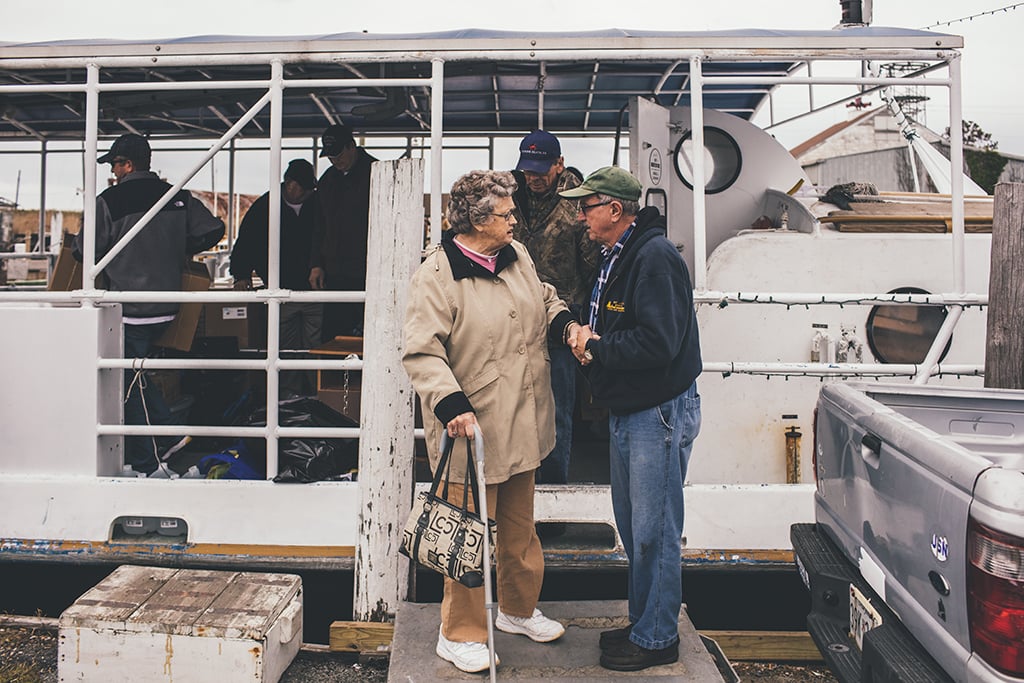
All the same, not long after arriving in Tangier, Suro and Hickey were able to convince some of the island’s remaining watermen, besieged by the seemingly ever-increasing cost of crabbing, to sign on. The guys from the city provided the capital and infrastructure; eight Tangiermen supplied the labor. For a few months, it worked beautifully. “When we pulled them out the first time and looked at them, there was silence for a moment,” Suro says. “The watermen were going, ‘Oh, my God—that’s like a clam almost, but it’s an oyster,’ ” polished smooth by the waves like a rock in a tumbler.
The calm didn’t last. In February 2015, just as they were beginning to prepare for their first harvest, one of the worst ice storms to hit the bay in 40 years came in. Tangier was inundated with snow, and the waves pounding the island quickly froze. A million oysters only a few months shy of maturity vanished into the bay.
Today, some weeks after the storm, the pair are inspecting the damage. Shivering in wetsuits that don’t quite fit, Suro and Hickey dive and reach, dive and reach, feeling their way toward the anchors that were supposed to hold their farm in place.
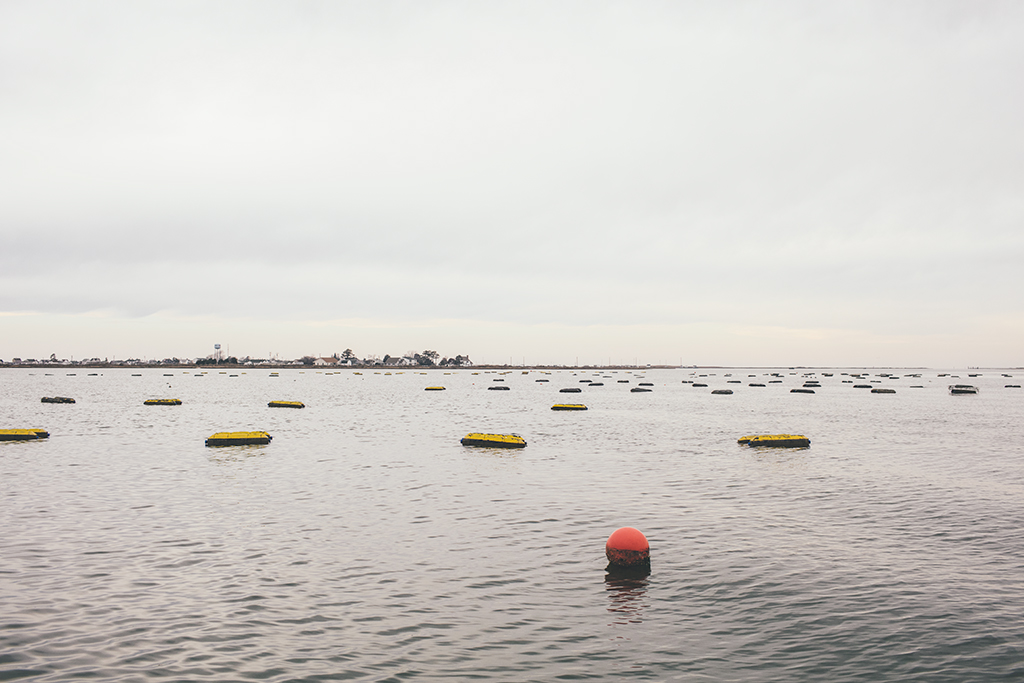
“It’s a little like Groundhog Day,” Suro says. “We’re just doin’ the same thing and the same thing and the same thing. We were supposed to be at this point months ago.”
Already, one of their best watermen has dropped out. Others are growing impatient. The prospect of another mutiny isn’t so far-fetched. “We’ve got a short amount of time, short amount of money, and we’ve got to make this work,” Suro says. “And I don’t like failure. Go. Hard.”
The good news is the anchors are still in place. As we motor back toward Tangier Harbor, Suro and Hickey are invigorated. Suro cracks open a beer, starts to riff.
“There’s just something majestic about oysters,” he says. “Tim and I, we can’t figure this out. What is so intriguing? What is so mysterious? What draws people into it? It’s an ugly f—ing rock with a placenta inside. . . . Clams—that actually should be the one people like, I think. Smooth, pretty contained, pretty neat. But you’re not clamoring for the clam roast—you want the oyster roast!” He pauses, takes a sip. “I think it’s DNA. I think it’s somewhere within us.”
“Very elemental, the oyster,” Hickey says, joining us from the bow.
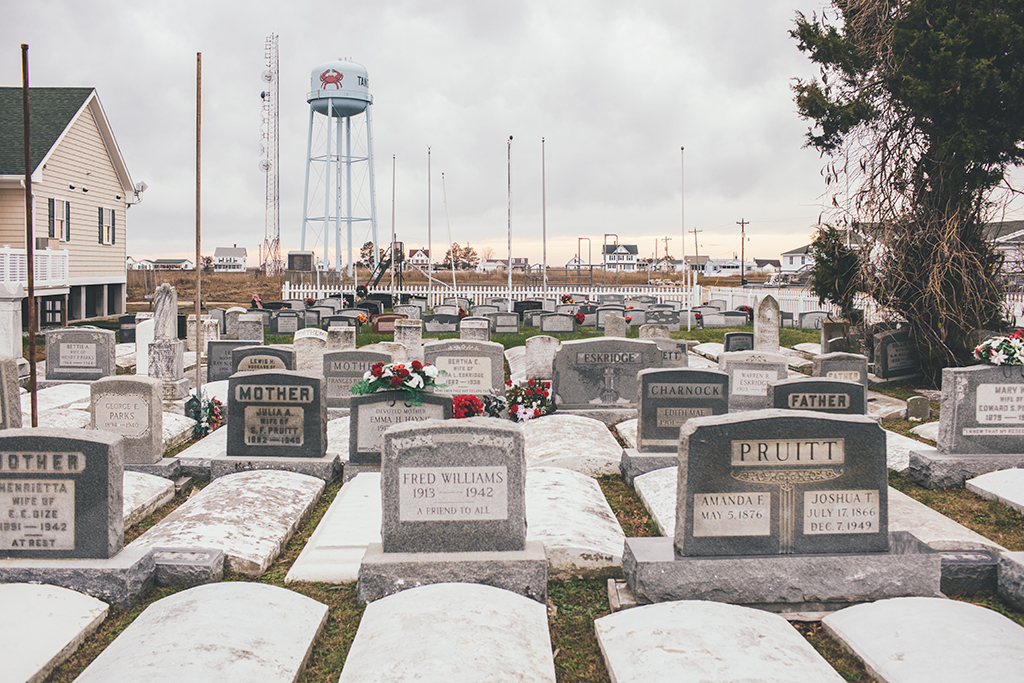
“The Indians were living off them,” says Suro. “I think there’s something so inside the human being that we’re not supposed to understand this. It’s just there.”
“Who was the Roman emperor who ate a hundred dozen in a sitting? Hundred dozen! In a sitting!”
“And then it gets its aphrodisiac thing going, you know. There’s something majestic—”
Inevitably—because, after all, Suro and Hickey are still a couple of pals drinking beer by the water—the conversation turns anatomical in ways that might displease the pair’s devout watermen colleagues, their highbrow-foodie target customers, and probably a lot of other people, too.
“It’s almost like pussy, the oyster itself,” says Hickey.
“It’s gross,” says Suro.
“Slippery.”
“Gross.”
“Gross. But you can’t resist!”
Suro is laughing now. “Quote that!”
“No, don’t!”
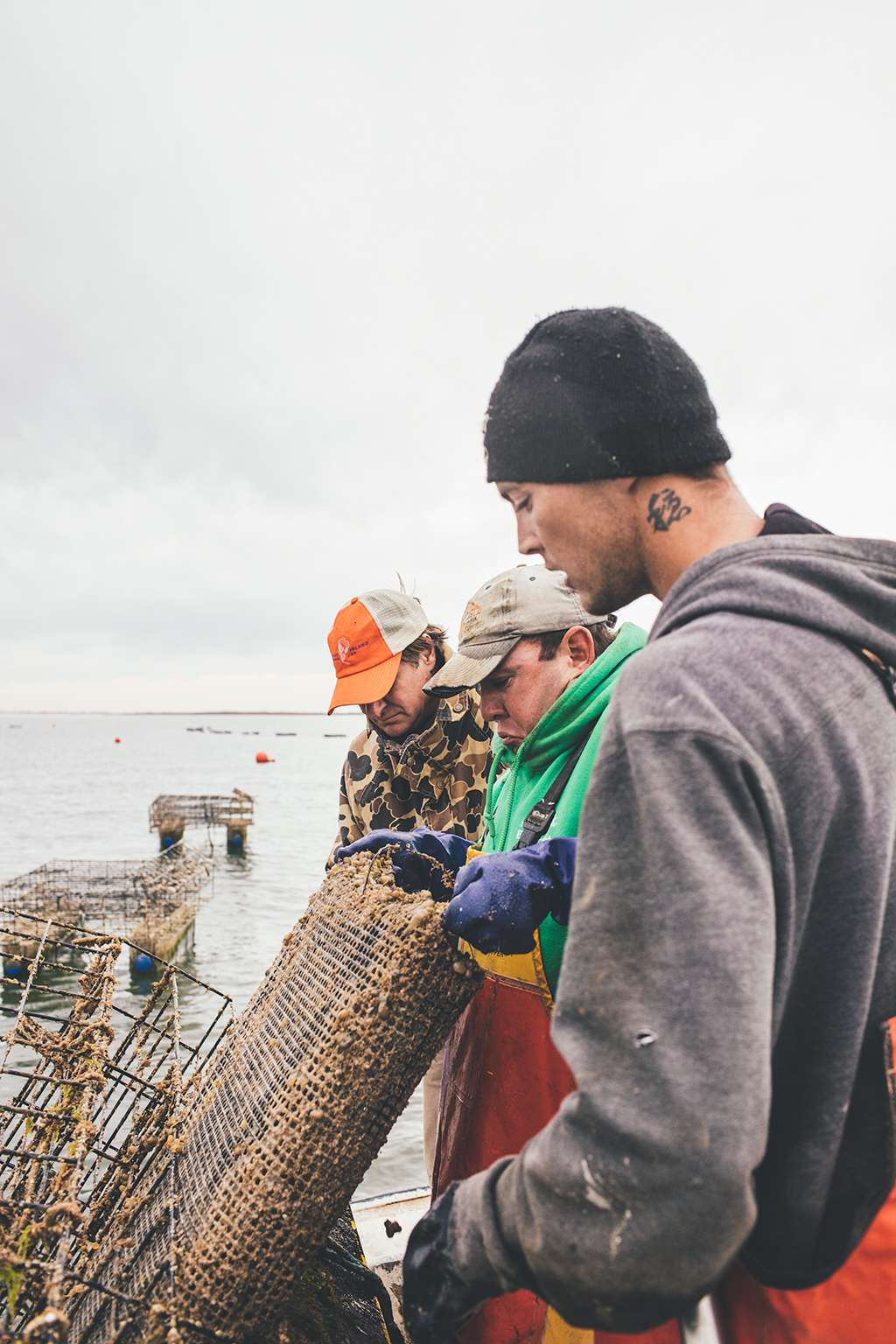
After Tim Hickey graduated from high school in Richmond, he went west in search of adventure. A friend knew someone in the cattle town of Abilene, Texas, and Hickey soon found himself on a ranch “nailing posts in the ground.” He learned a little roping and horse-riding when he wasn’t mending fences, saved a little money for college back East, and later went to graduate school in St. Louis for fiction writing. Eventually he married a Republican operative and landed on Capitol Hill.
In 2013, Hickey talked Suro into going duck-hunting on Tangier. Growing up, they’d heard stories of the island: a land of supposed inbreeds and thieves, where everyone hailed from the same three or four families. After shooting a few fowl with a friendly waterman named Thornie Thorne, they motored away with a different impression. “All that’s horseshit,” says Suro. “All f—ing horseshit.”
By then, Thornie was one of just 60 watermen left, working out of a small dwelling on the main channel, a ghost town of crumbling old crab shacks. Tangier claims the title “soft-shell crab capital of the world” and is said to have caught more crabs than any other town on the bay. But what was once a community of hundreds has been eroded by stricter catch regulations and the perks of life on the mainland, where you can drive farther than a few hundred yards in any direction. As one resident told me, a young person’s idea of fun on Tangier typically means meeting a few friends on the Hoistin’ Bridge to “shoot the breeze” or driving the island’s main loop on your bike or four-wheeler—round and round the mile-and-a-half circuit, music turned up high.
Still, “there was something cool going on out there,” Hickey remembers, a wildness that separated Tangier from modern life. “It’s the same reason I became a cowboy in Abilene.”
Hickey, now 42, decided he might like to stay permanently: find a home on Tangier for his family, or at least stay long enough to write something. His wife—a former executive director of the National Republican Congressional Committee who is now a senior adviser to Right to Rise USA, a Jeb Bush–aligned super-PAC—nixed the idea.
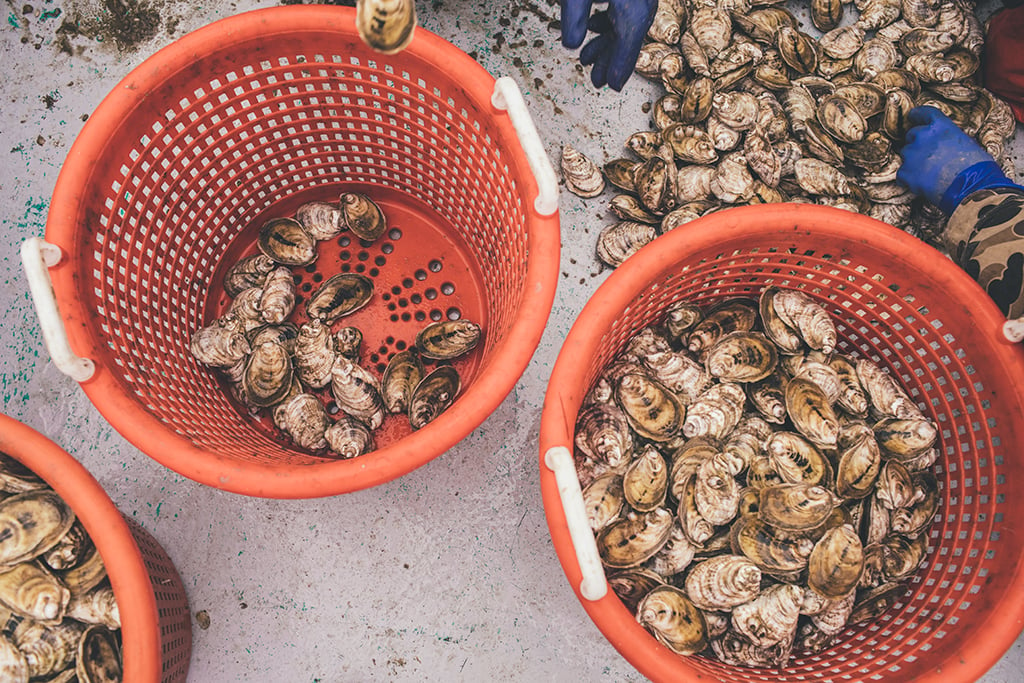
So Hickey developed a new plan: the oyster farm.
Demand for the bivalves, he knew, had skyrocketed. Other commercial farms had sprouted up along the bay’s fertile shores. At Union Market in DC, Rappahannock Oyster Company was charging $2.25 a half shell. And setting up a farm—some cages and bags for oysters to grow near the water surface, mostly—seemed like the kind of thing you could do without a lot of start-up capital. He and Suro could front the infrastructure and let the islanders take care of the rest. Tangiermen, after all, were hurting for money. Get the company off the ground and they might be able to create, Hickey says, “a livelihood for a bunch of people.”
Who knows, maybe in time they could even supplement oysters with crabs and fish, all sold under the Tangier name to mainland locavores eager to pay top dollar for regional delicacies.
“I went over to Eastern Market yesterday,” Hickey says, “and they had soft-shell crabs at $8.50 apiece. I like soft-shell crabs as much as the next guy, but hell, that’s a lot of money. If we can get all that going, the crabs and the oysters, I think Tangier will be back in business.”
Tangier is 12 miles from mainland Virginia, connected by a few seasonal ferries, a mail boat that runs six days a week, and an airstrip, used occasionally by a doctor who flies in from Newport News to see patients. The island has been a recognized oddity since at least 1916, when President Woodrow Wilson and his wife disembarked from their yacht and walked the main street out of “curiosity.” People know it for its unusual accent and for its small size—just a “dime on the map,” as one resident says. Few islanders keep cars there; most get around on golf carts.
When Wilson visited, a thousand people lived on Tangier. Today’s 450 full-time residents have a median age of 55. When the regulations that drove many away were discussed in the mid-1990s, a mother from the island stood up, according to the Virginian-Pilot, “and declared that the [government] was writing the death warrant for Tangier.” Last year, just six students graduated from the island’s sole school. The long-timers who have stayed, even as the island sinks and loses more feet of shoreline every year, are dug in. “The Tangier guys are probably the most entrenched wild fishermen we have” in Virginia, says Jim Wesson.
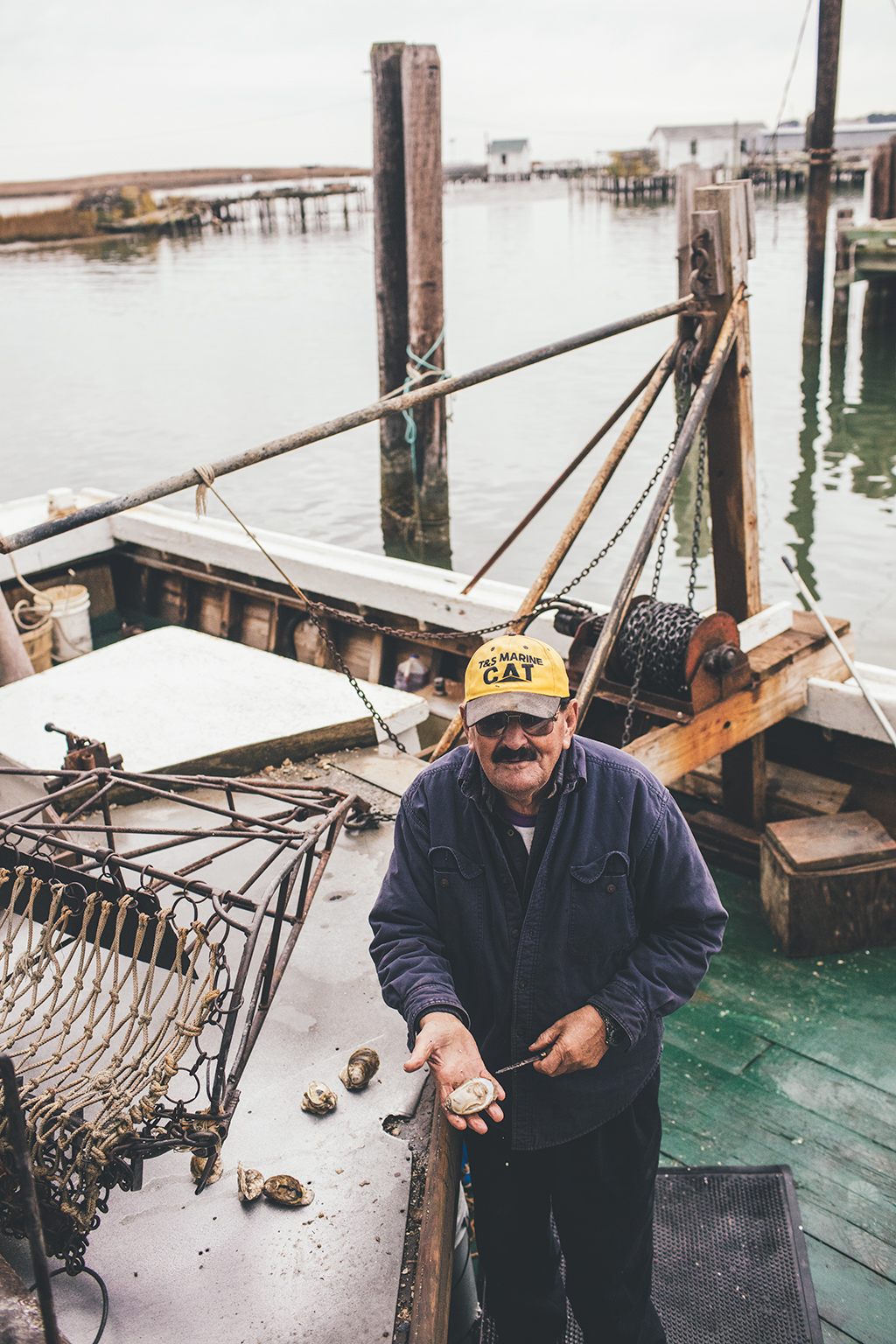
Wesson, a waterman turned marine biologist who works for the Virginia Marine Resources Commission, is best known as the state’s preeminent oyster guru. He’s of the mind that oysters grown at Tangier could be among the best on the East Coast. Maybe in the country. One day at a McDonald’s just outside of Richmond, he told Hickey and Suro they couldn’t have picked a more perfect place for their endeavor.
He also said they’d have a hard time getting the watermen to sign on.
Tangier has never much thrilled to would-be economic saviors from the outside. Resolutely Christian ever since a pastor who was nicknamed the Parson of the Islands lived there in the early 19th century, the isle is dry, without a bar or liquor store.
A century ago, legend has it, a shirt factory founded by mainlanders was set ablaze because Tangiermen didn’t like that their wives were being put to work. In the 1970s, a mainlander who founded a seaweed-processing plant on Tangier tried to develop vacation homes. Residents weren’t interested in Tangier’s becoming a tourist destination, and the businessman skipped town, his plant quickly shuttered.
In 1998, the town council voted unanimously to prevent Message in a Bottle, a movie starring Kevin Costner and Paul Newman, from filming on the island. The producers promised to inject thousands of dollars into Tangier’s economy, but council members explained that the PG-13 subject matter (drinking, sex, taking the Lord’s name in vain) wasn’t in line with the island’s values. The movie filmed in Maine instead, where it reportedly brought $15 million to the state economy.
Hickey and Suro saw what they were up against when they approached a Tangierman named Michael Parks. A 61-year-old barge captain, Parks was already oystering on the side, with 300,000 bivalves in cages sitting about a foot off the bay bottom. Hickey explained that the company was going to use a new system of floating cages just under the water’s surface. All Parks would have to do was flip the cages daily, briefly turning the oysters to allow sunlight to burn off algae and keep them from “gunking up.” Easy work. Then, once the oysters reached maturity, Parks could sell them to the company for a quarter each. Easy money.
Each cage could hold up to a thousand oysters. Maybe Parks would like to start with a few dozen?
Parks told Hickey he wouldn’t.
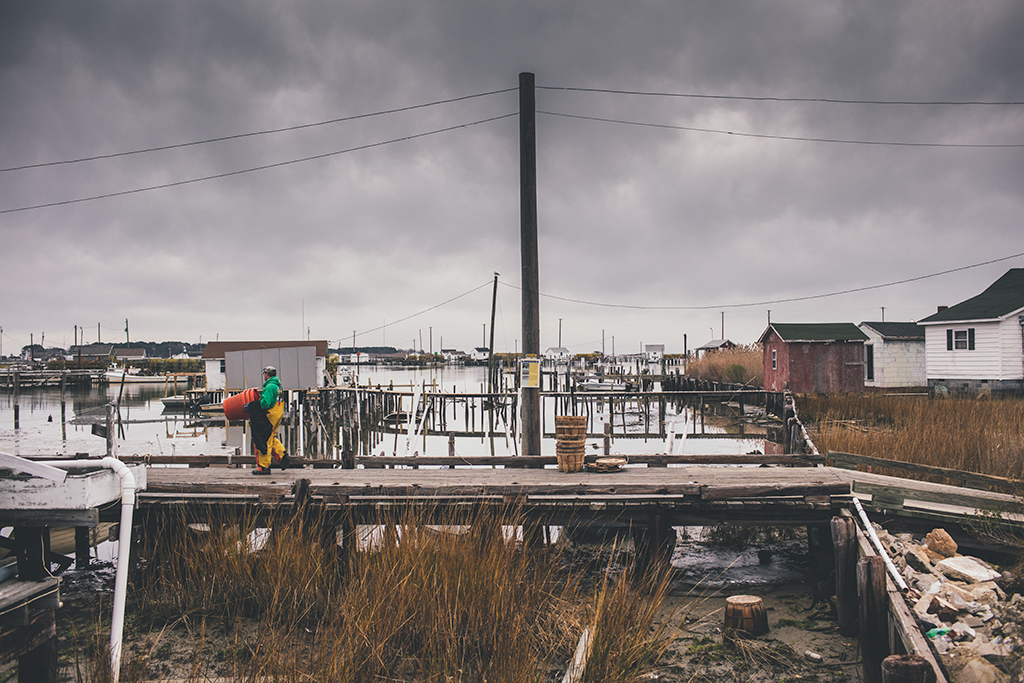
“I would not be interested in no one callin’ all the shots,” he explains. “You’re more or less workin’ for them. It’s a good deal, but you’re just under somebody else’s control then.”
Besides, he wasn’t sure he could trust anyone who thought the farming was easy work. “Put the cages in the water and a year later you’re selling oysters? No no no,” Parks says, “it’s nothing like that.”
The winter storm smashed into tiny Tangier last Presidents’ Day. Temperatures dropped into the teens, and the waves that hammered the island slowly turned to ice. “You look out there,” Ooker Eskridge, Tangier’s mayor, said a few days later, “and it looks like the Arctic.”
Twelve inches thick in some places, the ice had surrounded the town and covered the bay. Full-fledged icebergs towered on the horizon. Tangier has a grocery store with a small inventory of basic supplies, but no pharmacy. When a storm hits, the town is on its own. After being locked in for several days, residents wondered how long it might take before help arrived.
On the mainland, the Tangier Island Oyster Company worried about its crop. The pontoons that float each cage are designed to be sunk during bad weather, or even all winter, when cold temperatures limit growth. They weren’t: The islanders had figured that the winter storm season was over and had the cages at the surface when the storm hit. Overnight, the farm’s infrastructure, along with its crop of 1 million oysters, was sent careening into the bay. With the island imprisoned by ice, there was no going to look for them. “We had a Saturday-night prayer meetin’, things got so bad,” says Allen Parks, one of the company’s local watermen.
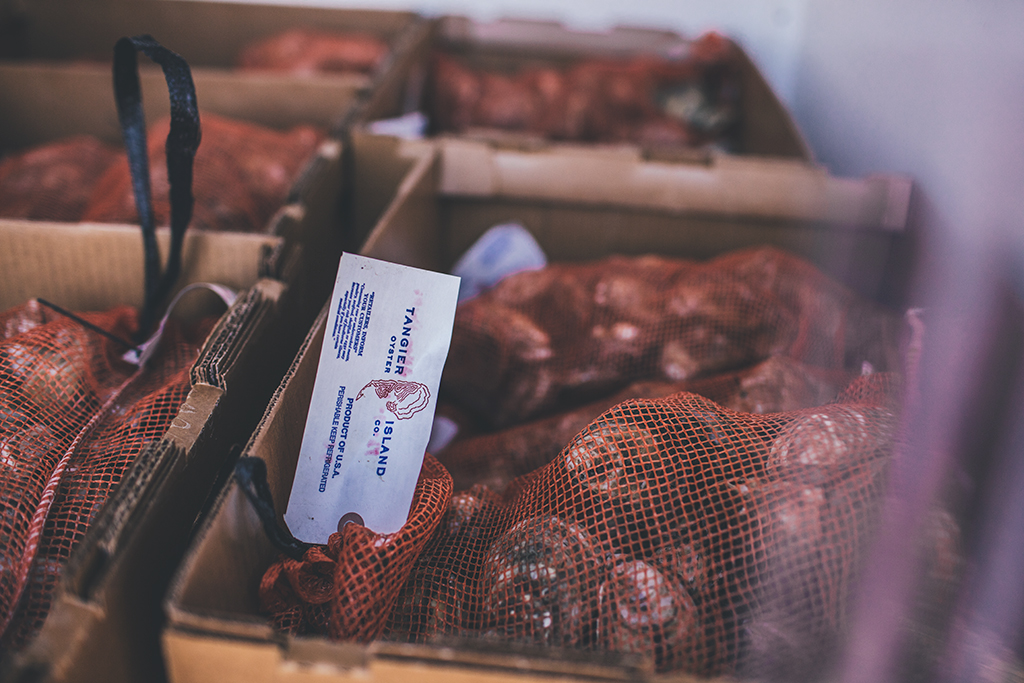
Four days into the freeze, the Virginia National Guard flew a Black Hawk helicopter to the island to unload food, medicine, and mail. The next day, a Coast Guard cutter traveled south from Baltimore to clear a path through the ice. A search party for a million fledgling oysters began.
The watermen and mainlanders went out in boats, aided by a throng of state and federal officials, even the US Coast Guard. People called in from as far south as Corolla, North Carolina, reporting damaged cages that bore the Tangier name. Driving over the Bay Bridge–Tunnel, 50 miles south of Tangier, Suro spotted a flotilla of their cages floating away.
By the final accounting, 600,000 oysters—a full 60 percent of the first crop—were gone.
Moreover, the islanders’ faith in the scheme was shakier than ever.
Through the months of planning, they had raised doubts and questions. Even watching the farm finally take shape, the watermen had remained skeptical. “This isn’t gonna f—in’ work,” Hickey remembers them saying. But they’d hung on, taking time out of their summer crabbing season to flip cages and check in on the oysters.
Now, however, forget about money—there was nothing even to show for their progress. One of the most involved, the mayor’s son, decided he was done with it all, as did three others. Says Suro: “We got absolutely crushed.”
Suro lives in a “manse,” as Hickey calls it. The Richmond home is encircled by a white picket fence with a password-protected gate and has a pool and guesthouse decorated with fishing poles and various pieces of Reaganabilia. (Suro’s father-in-law, the late Richard Sharp, cofounded CarMax while working as CEO of Circuit City, and later was chairman of Crocs.)
Hickey likes to pit-stop at the manse before a day’s work on the water, which is how we arrived one Friday night last June to find Suro flustered. “Ken’s coming with us tomorrow,” he announced. “Hardly comes out for two years and then picks this weekend.”
That’s Ken as in Cuccinelli, the former Virginia AG and gubernatorial candidate, also an old acquaintance of Suro’s. Suro has many old acquaintances. He is, as he once told me over Yuenglings and a campfire, “verbose.” His first great business dream was to become the youngest franchisee in Wendy’s history. But after being robbed at gunpoint twice while on shifts as a manager, he gave that up and decided on government.
He joined the administration of Virginia governor Mark Warner and, from 2002 to 2006, was assistant secretary of health and human resources. He admired Warner because, he says, “the man could get things done,” but he left disillusioned with the sense that “if you tell the truth too much, you won’t win.”
If Hickey is the Tangier Island Oyster Company’s visionary, Suro is its fixer. It was through his Richmond connections that the company was introduced to Wesson, the oyster guru. And how it has an in with Virginia’s secretary of agriculture and forestry, Todd Haymore—whom Suro also sometimes sees at his son’s swim meets. Haymore is a coordinator of the new Virginia Oyster Trail, a marketing scheme in which Tangier hopes to figure prominently.
What I told Cuccinelli is: Stand down. You’re the lawyer. That’s it.
Suro first met Cuccinelli when the latter was a state senator, and he “always thought he would be fun to work with in business.” So when the farm idea took shape, he gave Cuccinelli a call. Now president of the Senate Conservatives Fund PAC, Cuccinelli is the oyster company’s chief legal counsel. He’s also a symbol of far-right conservatism and homophobia, the attorney general who famously fought for a state law that would have banned oral and anal sex—a fact that has at times complicated business for the oyster company, according to Suro. “What I told Ken is: Stand down,” he says. “You’re the lawyer. That’s it. You’re the f—ing lawyer—and you’re a phenomenal lawyer—but that’s it.”
Cuccinelli began keeping a low profile after the Washington Post ran a story about his ties to the farm; this will be only his second trip working on the oysters. Yet in another way, he has become one of the company’s best assets. When it comes to building trust on Tangier, where perhaps the most prominent landmark after the water tower is a large cross bearing the words CHRIST IS LIFE, the Cuccinelli name affords significant political capital. Even if not everybody recognizes him.
“I didn’t know who he was,” waterman Allen Parks says of meeting Cuccinelli for the first time. They were talking, and politics came up. “I asked, ‘Would you ever be interested in runnin’ for governor?’ ‘Well, maybe,’ he said. I didn’t know who he was—he just said his name was Ken! I felt like such an idiot. I mean, I voted for the guy.” (Cuccinelli won almost all of the vote on Tangier in his 2013 race for governor.)
In the morning, we meet up in Kilmarnock at the bay home of partner Baylor Rice, the compounding pharmacist. Cuccinelli, wearing a blaze-orange deer-hunting cap, is there along with another partner, 34-year-old Michael Congdon, a hip-hop producer in Richmond. Hickey carries an e-cigarette and a tin of Skoal. Most everyone on the crew dips, Hickey especially. (On one drive south, I watched him use his dog’s water bowl, balanced precariously against the gear stick, as a spittoon.)
We pile into a boat whose actual name is the Sea Cat but in conversation is known as the Sea Pussy. It’s not always the easiest boat to start—when Cuccinelli fails to get it going after a couple of tries, Rice grins from the dock. “Did you talk sweet to it?” he asks.
“I did,” Cuccinelli mutters, “but you didn’t hear.”
The plan today is to clean a pier and shed that the company has rented from the widow of a waterman named Puge, and to prep for more production. Although the first, and now smaller than expected, crop isn’t even out of the water, the company wants to expand the farm size to 2 million. Looking after these baby oysters, or “spat,” is the job of Chuck Bartlett, Suro’s pool guy. He was brought onboard one day when Suro asked him if he might know anything about engineering a pump system for the spat incubator. He did, and he now has a 4-percent stake in the company.
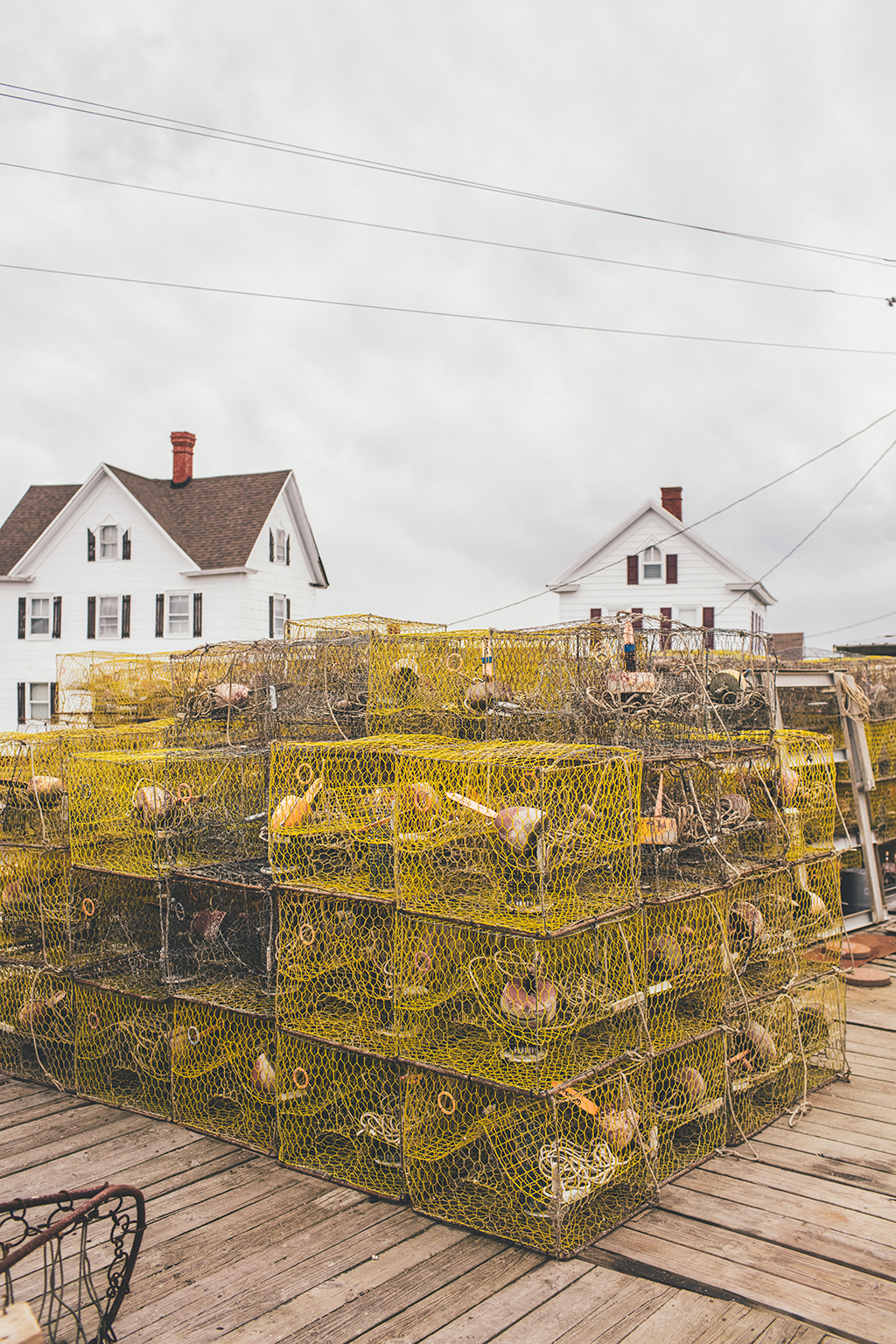
A Tangierman occasionally walks by the dock and says hello, but otherwise there’s not much curiosity about the shirtless former attorney general and men from the city dismantling an old dock. But unlike those frigid winter outings, today is sunny and warm and suggestive of possibility. There’s talk of the future, of what will become of the dock once the additional field is set up and the bivalves are back on the water, of all the new incubator “upwellers” Bartlett will build.
Tangier’s wetlands and beach are lovely, but westerly breezes enhance the smell of all the trash the island burns. Dumping is common in the waters just offshore—an abandoned boat propeller and gas tank lie in the water just below us. During the summer season, the biting flies are typically out looking for blood. All the same, Hickey can see a flagship for the Tangier Island Oyster Company right here on this dock, can see Bartlett’s incubators—which look as if they were designed by someone at Apple—anchoring an outdoor restaurant full of bay cruisers out for an afternoon ride.
“Just tie up your boat, step onto the dock, and have a few oysters—with the upwellers right here,” Hickey says. “It’d be just like a microbrewery, where you drink by the tanks.”
Except that Tangier is dry.
He pauses. “We just don’t want to alienate anyone,” he finally says, perhaps wondering if the idea needs some refining.
• • •
Any future for the island’s oyster company definitely includes Allen Parks. The 37-year-old waterman has lived on Tangier all his life and came up crabbing under his dad and grandfather. He’s been his own boss since he was 15. “It’s a good life around here,” he says one morning out on the bay. “We get up early. Put in long, hard hours. It’s kinda like we’re set apart from the world, on our own schedule and our own time.”
As the sun comes up, Parks and his mate check crab pot after crab pot—more than 400 of them, gaffed, emptied, rebaited, reset, all in the span of a minute. It’s back-breaking work. And it seems to get more unpredictable with each year. Crab counts going up and down, catch limits, volatile prices, having to count on young apprentices who don’t always show up.
Parks likes to say, “Tangiermen don’t like change—Tangiermen like the same.” But the crab industry isn’t the same as it used to be, and Parks isn’t the same as a lot of Tangiermen. To him, oystering for the mainlanders looked like a not-half-bad way to bring a lot more stability and money into his life. When Hickey and Suro approached him, he was moving out of a trailer into a brand-new home, married with a kid on the way. He was one of the first to sign on and, even after the ice storm, felt optimistic about how the farm could grow and supplement his crabbing. “I see it being 75 percent of my living,” he says.
One Sunday morning, I go to meet Parks at his church, the New Testament Congregation, one of two on the island. Originally there was just Swain Memorial United Methodist, which every Tangier family attended after its founding in 1835. But in 1946, the pastor felt a calling and left to establish New Testament as an evangelical alternative. The schism split the island in two: New Testament’s little organ was thrown into the bay, its chairs were broken, windows smashed, and pews smeared with human excrement. As recounted in 7 Acres, a history of the church, Virginia governor William Tuck had to convene a grand jury and involve the FBI before the violence stopped.
You think these guys are clueless? Smarter than you’d ever guess.
Seventy years later, Parks’s father, one of several elders who preach, is finishing a sermon on the Holy Spirit. The crowd sings from a slim, stapled hymnal, though most know the words by heart, and finishes with a children’s song: The rain came down and the floods came up, and the wise man’s house stood firm.
A half dozen people stand up to give testaments, offering thanks for the island’s good Christian character, and for the crab shacks, and for the providence of the Lord, who saw everyone through the season even after a hard winter. Miracles are recalled: a cancer healed, an ice storm survived. One man testifies that he was walking along the beach recently when he came across a sea bird in flight and was struck by God’s creation.
At noon, the congregation files out and I search for Parks, who, it turns out, isn’t among them. The ferry captain fell ill, and on his one day off the water, Parks offered to take his place.
“You think these guys are clueless? Smarter than you’d ever guess,” Hickey says. “Allen’s close to a philosopher oysterman. He thinks a little more deeply than—well, shit, most people. He’s just about the most un-full-of-it guy that I know.”
• • •
As Hickey and Suro waited (and waited) for their new first crop to reach maturity, they got to work figuring out where exactly they could sell it. Suro thought the oysters should go to restaurants that understood the company’s locavore mission, or what he dubbed “the dock-to-dish movement.” Striking the deals, however, was proving tricky. Some of the company’s partners had connections to restaurants in New York and Palm Beach, but the restaurants seemed hesitant to deal with a new outfit that had no track record.
At the same time, Suro’s health began to deteriorate. His legs “felt like jelly” when he worked on Tangier. He couldn’t sleep. He went to a dozen doctors, none of whom could identify what was wrong. One suggested he see a psychologist; another thought it might be posttraumatic stress disorder linked to the Presidents’ Day oyster loss. It turned out to be Lyme disease.
Still, Suro was definitely having doubts about the farm. One day in September, he decided he was moving the company in the wrong direction. The barge captain Michael Parks was right—growing oysters was hard work, yet here were Suro and his partners, none of them with any food-industry bona fides, trying to get their product in front of hot chefs in one of the country’s food capitals.
If the Tangier Island Oyster Company was going to survive, it would need a distributor that knew what it was doing.
Suro called the Rappahannock Oyster Company, the Croxton cousins behind the $2.25-a-half-shell oysters at Union Market. “These Rappahannock guys go down to the water every day,” Suro says. “They can see, touch, talk to their employees every day.
“We can’t do that. It’s all Allen. He’s the guy. The leader.”
There was some back-and-forth, and then the deal was sealed. Tangier would produce roughly a million oysters a season, and Rappahannock would get them first to their own restaurants and later to others around the country. Suro almost couldn’t believe it himself, how far the company had come. “This should not have worked,” he says.
• • •
On December 1, the Tangier company’s first oysters were iced, shipped across the bay on Tangier’s mail boat, and placed in trucks headed for Washington and Richmond, out of the water at last. It was inauspicious timing. A week later, researchers with the US Army Corps of Engineers released a provocative report showing that Tangier’s land-loss problem was worse than many had realized.
Depending on how fast sea levels rise, the report said, the town might have to be abandoned within 50 years. In a worst-case scenario, that number could drop to 25 years. “If no action is taken,” the report concluded, “the citizens of Tangier may become among the first climate change refugees in the continental USA.”
Some, though, might think of such a scenario as history repeating itself. A short skiff ride to the north of Tangier proper lies a marshy bit of land called the Uppards, which used to be connected to Tangier and was home to its own set of “ridges” where residents lived, shopped, and sent their children to school. Due to land loss, some had to evacuate in the 1930s, and floated their homes over to Tangier on barges. The land is now so far gone that after Hurricane Sandy hit in 2012, Tangier residents were horrified to discover exposed skeletons strewn across the abandoned marshland, its 19th-century cemetery largely under water.
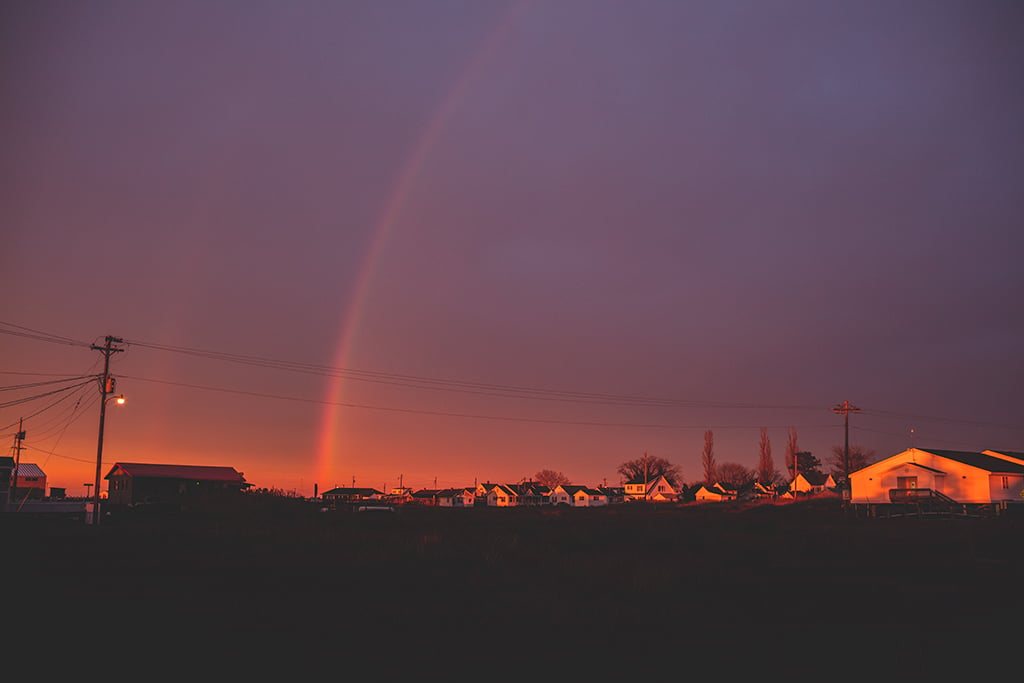
The rest of Tangier has somewhat staved off the encroaching seas through manmade intervention. In the middle of the 20th century, the island was losing a dozen or more feet of shoreline a year, but a seawall that went up in 1990 has helped keep the western shore—including Allen Parks’s two-story Cape Cod home—from being submerged.
Someone way above me is going to have to decide if the town is really worth saving and relocating.
Still, you don’t have to walk very far for evidence of how much island has managed to slip away. Down the street from Parks’s house, the Tangier public beach is a fraction of what it was when British soldiers constructed a fort on it during the War of 1812. “Shooting used to be allowed one mile from town limits,” reads a notice posted at the Tangier grocery. “Since there is no longer a mile of beach left, no one will be allowed to shoot.”
After Sandy, the federal government approved a $4.2-million jetty for an area of Tangier that would, it was hoped, protect its crab shacks. Progress on the jetty stalled, however, and a definite construction date hasn’t been set. Which, according to David Schulte, lead author of the Corps of Engineers study, actually won’t matter. Even if a breakwater were built around the whole island, sea levels are still rising and would ultimately flood the town if other measures aren’t taken as well, he says.
“Someone way above me,” Schulte adds, “is going to have to decide if the town is really worth saving and relocating.”
In Tangier, though, few people believe in climate change. Locals mention that land loss from erosion is nothing new: Mayor Ooker Eskridge told me about how his family was among those who floated their homes over from the Uppards. On the mainland, Cuccinelli has made a name for himself as one of Virginia’s most tireless climate-change skeptics, fighting environmental regulations and what he claims is flawed and biased research. The rest of the company isn’t too worried, either. They’re pushing ahead with the second set of cages they’ve long talked about.
And to their surprise, they have a new recruit joining up, a 27-year-old waterman-in-training named Justin Gaspard. He grew up on the Gulf Coast and on the Virginia Peninsula, enlisted in the Army, then found Tangier during a sailing trip two summers ago and decided he might like to stay. Suro and Hickey see him as the next generation: an apprentice to Allen Parks, whom they’ve begun to entrust with more of the company’s day-to-day operations.
Suro, as always, is optimistic: “One, it’s not hard seeing the government helping, and, two, people might leave, but it’ll just go from 500 to 300.”
The company, he adds, might even be able to help. An oyster boom could get Tangier more notice, and then push a politician or two into making something happen. No, “I’m not worried at all,” Suro says. “There’ll always be people there.”
Harrison Smith (@harrisondsmith on Twitter) has contributed to the Washington Post and Chicago magazine. He can be reached at harrison.daryl.smith@gmail.com.
This article appears in our March 2016 issue of Washingtonian.

